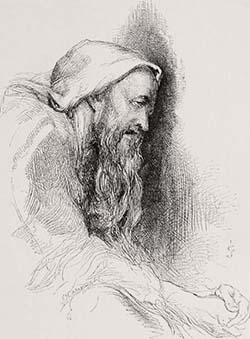 The Book of Job (Biblical Hebrew: אִיּוֹב), or simply Job, is a book found in the Ketuvim (“Writings”) section of the Hebrew Bible (Tanakh), and is the first of the Poetic Books in the Old Testament of the Christian Bible. Scholars are generally agreed that it was written between the 7th and 4th centuries BCE. It addresses theodicy, why God permits evil in the world, through the experiences of the eponymous protagonist. Job is a wealthy and God-fearing man with a comfortable life and a large family; God, having asked Satan (הַשָּׂטָן, haśśāṭān, ‘lit. ’the adversary”) for his opinion of Job’s piety, decides to take away Job’s wealth, family and material comforts, following Satan’s accusation that if Job were rendered penniless and without his family, he would turn away from God.
The Book of Job (Biblical Hebrew: אִיּוֹב), or simply Job, is a book found in the Ketuvim (“Writings”) section of the Hebrew Bible (Tanakh), and is the first of the Poetic Books in the Old Testament of the Christian Bible. Scholars are generally agreed that it was written between the 7th and 4th centuries BCE. It addresses theodicy, why God permits evil in the world, through the experiences of the eponymous protagonist. Job is a wealthy and God-fearing man with a comfortable life and a large family; God, having asked Satan (הַשָּׂטָן, haśśāṭān, ‘lit. ’the adversary”) for his opinion of Job’s piety, decides to take away Job’s wealth, family and material comforts, following Satan’s accusation that if Job were rendered penniless and without his family, he would turn away from God.
In chapter 1, the prologue on Earth introduces Job as a righteous man, blessed with wealth, sons, and daughters, who lives in the land of Uz. The scene then shifts to Heaven, where God asks Satan (Biblical Hebrew: הַשָּׂטָן ’lit. ’the adversary”) for his opinion of Job’s piety. Satan accuses Job of being pious only because God has materially blessed him; if God were to take away everything that Job has, then he would surely curse God.
God gives Satan permission to take Job’s wealth and kill his children and servants, but Job nonetheless praises God: “Naked I came from my mother’s womb, and naked shall I return there; the Lord gave, and the Lord has taken away; blessed be the name of the Lord.”
In chapter 2, God further allows Satan to afflict Job’s body with boils. Job sits in ashes, and his wife prompts him to “curse God, and die”, but Job answers: “Shall we receive good from God and shall we not receive evil?”
In chapter 3, “instead of cursing God”, Job laments the night of his conception and the day of his birth; he longs for death, “but it does not come”. His three friends, Eliphaz the Temanite, Bildad the Shuhite and Zophar the Naamathite, visit him, accuse him of committing sin and tell him that his suffering was deserved as a result. Job responds with scorn: his interlocutors are “miserable comforters”. Since a just God would not treat him so harshly, patience in suffering is impossible, and the Creator should not take his creatures so lightly, to come against them with such force.
Job’s responses represent one of the most radical restatements of Israelite theology in the Hebrew Bible. He moves away from the pious attitude shown in the prologue, and begins to berate God for the disproportionate wrath against him. He sees God as, among others, intrusive and suffocating; unforgiving and obsessed with destroying a human target; angry; fixated on punishment; and hostile and destructive. He then shifts his focus from the injustice that he himself suffers to God’s governance of the world. He suggests that the wicked have taken advantage of the needy and the helpless, who remain in significant hardship, but God does nothing to punish them.
The dialogues of Job and his friends are followed by a poem (the “hymn to wisdom”) on the inaccessibility of wisdom: “Where is wisdom to be found?” it asks, and concludes that it has been hidden from man (chapter 28). Job contrasts his previous fortune with his present plight, an outcast, mocked and in pain. He protests his innocence, lists the principles he has lived by, and demands that God answer him.
Elihu (a character not previously mentioned) occupies chapters 32 to 37, intervening to state that wisdom comes from God, who reveals it through dreams and visions to those who will then declare their knowledge.
From chapter 38, God speaks from a whirlwind. God’s speeches neither explain Job’s suffering, nor defend divine justice, nor enter into the courtroom confrontation that Job has demanded, nor respond to his oath of innocence. Instead God contrasts Job’s weakness with divine wisdom and omnipotence: “Where were you when I laid the foundations of the earth?” Job makes a brief response, but God’s monologue resumes, never addressing Job directly.
In Job 42:1–6, Job makes his final response, confessing God’s power and his own lack of knowledge “of things beyond me which I did not know”. Previously he has only heard, but now his eyes have seen God, and therefore, he declares, “I retract and repent in dust and ashes”.
Epilogue: God tells Eliphaz that he and the two other friends “have not spoken of me what is right as my servant Job has done”. The three (Elihu, the critic of Job and his friends, is not mentioned here) are told to make a burnt offering with Job as their intercessor, “for only to him will I show favor”. Job is restored to health, riches and family, and lives to see his children to the fourth generation.
The Book of Job has been called the most difficult book of the Bible. The numerous exegeses of the Book of Job are classic attempts to reconcile the co-existence of evil and God and address the problem of evil. Scholars are divided as to the origin, intent, and meaning of the book.